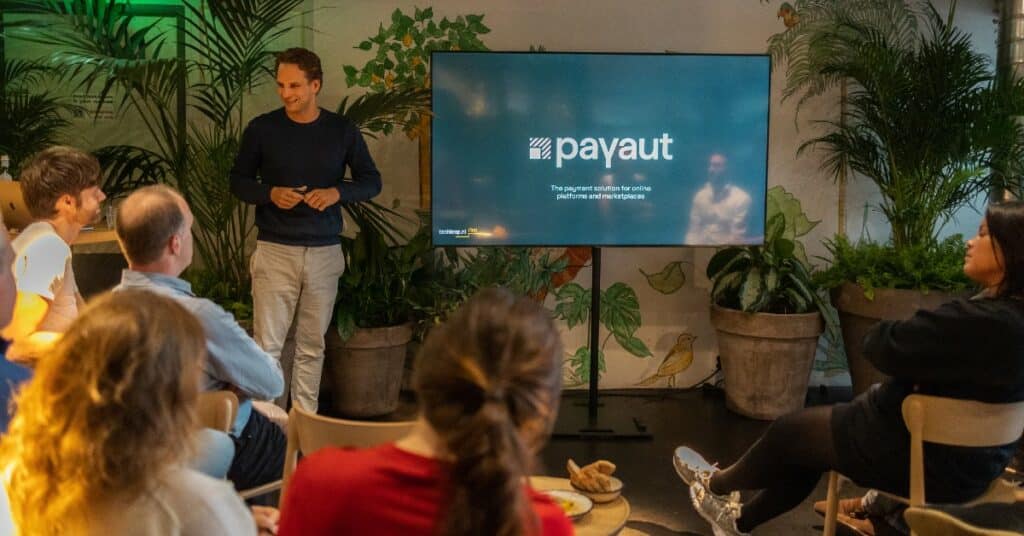Payments have played a key role in enabling the digital economy and there are now more payments solutions for consumers and merchants than ever before. With cash payments declining fast and merchants also stepping away from cash, the way we make and receive payments has changed for good.
A report by Payments Europe shows that physical cards continue to be the preferred method of payment but options like mobile cards, mobile instant, and BNPL are on the rise. This change in payment methods and multiple Payment Service Providers (PSPs) in the market means merchants must be able to support them all. Amsterdam-based Payaut makes that possible.
An all-in-one payment solution for marketplaces

Payaut is the only payment solution for a marketplace that can process with any payment service provider. It became a marketplace solution for payments based on the expertise of its founder Ernst van Niekerk, who started his career as a client of a payment service provider.
During this stint, he learnt that “if you are a merchant processing online payments, different providers can provide different benefits. There is not one single PSP that is perfect.”
Following this experience, Van Niekerk then became a consultant in payments and worked at Adyen, a popular payment service provider. At this PSP, Van Niekerk developed their marketplace solution, and during this process, he realised how the existing marketplace solutions of PSPs are designed to create a lock-in.
“The lock-in means that you can’t use multiple payment service providers at the same time, and lack the opportunity to optimise for conversion and price,” he says.
All these events set him up to start Payaut as a PSP-agnostic platform that offers the flexibility to process via any payment service provider. The founder says that paying online now has become increasingly easy for consumers, but the backend system supporting all those payments has become increasingly complex.
Ernst gives examples of people using different methods to pay in the Netherlands compared to those in Germany or the US. As a result, there is now different behaviour from payers, buyers, and consumers. “Therefore, it is not easy to find one payment provider that is a perfect fit,” he adds.
The overarching theme of the payment industry is that there are a lot of payment providers out there offering different advantages. However, there is no one payment provider that is a perfect fit for all the use cases. With Payaut, merchants are able to choose the payment provider they need based on their size, cost, and coverage of payment methods per country.
Shift towards platform economy

As a seasoned executive in the payments industry, Van Niekerk says that the payments industry was seen as “the winner takes it all” market. “They expected maybe three, four or five players like an Adyen or Stripe to be the only ones left and that all the small players would have no right to exist,” he explains.
However, the reality is that there are many payment providers out there with some being strong in one market and others in another market. Van Niekerk remarks that there are some PSPs who are promising, innovative, while many others are traditional.
The changing consumer behaviour and the need for merchants to support different payment service providers has led to what the Payaut founder describes as a shift towards platform economy for payments industry as well. For him, Payaut is essentially the payment platform for online marketplaces.
To power this shift towards platform economy for payments, Payaut has raised a total of €12M. It has also grown from just 3 to 30 employees with two in sales, five across the leadership team, and 20 on product and tech. “We’ve been building the product for three years and we are now ready to scale it,” says Van Niekerk.
Rise is about learning, networking, and marketing

Ernst Van Niekerk joined nine other Dutch scaleups as batch #9 of Techleap.nl’s Rise programme this year. For him, joining this programme was a no-brainer and one where he had very clear expectations.
“I expect three things from [Rise programme],” he says with clarity. Since it is his first time building a company – and currently taking it from a startup to scaleup – Van Niekerk recognises that Rise is an opportunity to learn from those in a similar situation: “the cool thing about the programme is that everyone is a startup who wants to scaleup”.
For Ernst, the second thing is network. He sees Rise as an opportunity to increase the network, speak to other companies and maybe get “some new clients, get some new talent, get some new ideas, and expand the network.”
The third expectation is marketing, an opportunity for more people, specifically potential clients, to discover Payaut. All this also culminates in further boosting one of the key areas, and a core company value, of the business: People.
After the Rise programme, Van Niekerk says Payaut’s focus for 2023 and beyond is to continue to cultivate the best engineering team and sales team in order to scale the business from here. “We have a great team,” he says, “And for now, we just want to make sure that we grow the business – as in growing customers and growing the revenue.”
Building the service and product
Ernst Van Niekerk is a purist, one with deep commitment and focus on building the service and product. He says Payaut has sufficient runway and therefore are not planning to fundraise any time soon. The company has a clear Sales strategy, specifically with the focus to roll-out the service in the rest of Europe. Van Niekerk adds there are also imminent plans to increase their product feature portfolio with “a multi-currency functionality which allows us to payout globally and not only in euro-countries”.
For Payaut, the long term vision is building a platform that allows merchants to accept payments not only from different PSPs but also from different markets. The success of Payaut is also an example in how market scalability is important for anyone to succeed in the fintech space.
On a final note, the Payaut founder recommends that young entrepreneurs should be both smart and curious: “you will encounter a lot of challenges and you best face them with an open mindset”.










01
From telecom veteran to Dutch Startup Visa success: The Jignesh Dave story